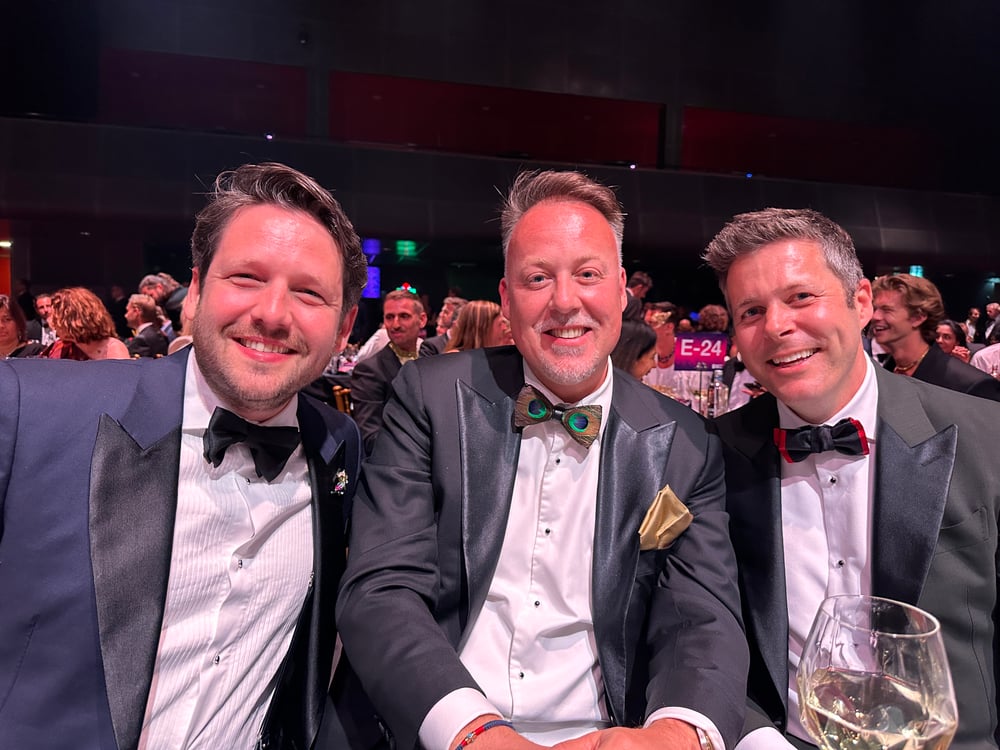"Wow, I don't think there's anyone who's not in tears right now."
"To have the courage to speak about this to the whole company is just humbling. You're both amazing."
"That was very touching and so important. I learned a lot today."
These are just a few of the reactions from our latest company-wide meeting. Normally, these weekly meetings don't make people cry (despite Richard's singing attempts), but this edition was as emotional as they get. It started off with a powerful question:
Table of contents
Do you know anyone who’s HIV positive?
"Well, now you do," our colleagues Ruari and David proclaimed to 750+ people and proceeded to share their very personal experiences with HIV, inviting us for an intimate look at their post-HIV diagnosis worlds. They spoke about the initial shock and despair, described the fragile vulnerability of reaching out to their loved ones and asked us to consider the daunting prejudice they have to deal with caused by the ongoing stigma around HIV.
By the time David and Ruari spoke about being met with rejection and even blind hate because of their HIV positivity, no one was able to contain tears or feel anything other than respect and gratitude for the openness we'd just witnessed.
The wild emotional rollercoaster turned into an educational moment as they shared some invaluable information about living positively. Here are the three main takeaways:
1. HIV is no longer a death sentence
The early years of the HIV epidemic were truly awful. Although there are movies, books and plays that portray the era, nothing can impart the misery and despair of the patients receiving a death sentence. Even decades later, when Ruari's test confirmed he was HIV-positive, his first thought was: "Yeah, I'm going to die."
Luckily, he was wrong. There's still no cure or vaccine, but newer antiretroviral drugs have made HIV a survivable condition treatable with a single daily pill. And there are other options if one medication causes side effects or doesn't work. Nowadays, HIV-positive people can look forward to long, healthy lives.
2. Undetectable = untransmittable (U = U)
Ruari and David take one pill each day that keeps the virus undetectable and untransmittable to others. This is estimated to be 100% effective as long as the person takes their medication and stays undetectable, which means there's not enough HIV in their biofluids to pass on during sex. In other words, they are not infectious, even when not using a condom.
Knowing this is especially useful for people wishing to have a child. Couples in which one person has undetectable HIV and the other is HIV-negative can have unprotected sex to conceive. Unfortunately, the law on HIV has yet to catch up with science. In some countries, condomless sex without disclosing your HIV status is a criminal offense, regardless of the likelihood of transmission.
3. Education and raising awareness matters
The stigma surrounding HIV is persistent, and the virus disproportionately affects gay and bisexual men of color, particularly black men, due to inequality in many areas. HIV positivity advocates want to see better sex education in schools, improved access to health care and, ultimately, an end to the epidemic.
When it comes to the fight against HIV/AIDS, awareness plays a critical role. Actionable behaviors like HIV testing, taking PrEP, sharing the location of needle exchanges in your community, or the date of the next condom distribution event all help stop the virus.
Amsterdam Dinner Foundation 2023
Do we accept a world in which love could scare us to death? That was one of the questions asked by Amsterdam Dinner Foundation, an organization raising HIV awareness and money to support innovative and life-saving projects every year.
Each year, they host a spectacular event powered by partners and entrepreneurs who want to make a tangible contribution and change the world for the better. Mews is proudly among the companies supporting the cause – our CEO, Matt Welle, attended the gala dinner along with other Mewsers.
"Supporting this initiative is of utmost importance to me, both on a personal and business level," said Matt. "As a human, I want to commit to fighting the HIV stigma and discrimination this community faces. And as a hospitality professional, I am thrilled to see TSH and Choice sponsoring tables at this event too. It shows our industry runs on empathy and cares about people."

Matt (right) at the 2023 Amsterdam Dinner Foundation.
What are the next steps?
Once we've emotionally recovered from David and Ruari's talk, we'll start planning our next steps. We want to shine a light on inequalities and do our part in helping to address them by facilitating action. No spoilers, but World AIDS Day on 1st December seems like a fantastic opportunity to do so.
In the meantime, staying curious and asking questions is the easiest way to break the stigma around HIV. For now, we'll leave you with another reaction to Ruari's and David's stories:
"Proud to work for a company with people as brave as this."

Author
Anuška Linc
Anu prefers unscrambling words over mincing them. Always punny, sometimes funny. You will find her if you want to in the garden unless it's pouring down with rain.

Essential hotel technology for general managers
Download now
Hospitality hot takes straight to your inbox


.webp)